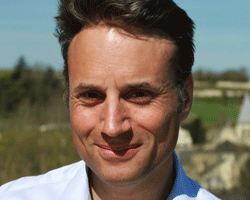
Adam Parr is the chief executive of the Sported Foundation. An English lawyer and businessman who has lived and worked in Africa, Australia and Japan, Adam joined Sported after five years as chief executive and chairman of the Williams Formula One Team.
Sport is completely fascinating. There are always three dimensions: money, politics and then the sport itself. This applies just as much to the grass-roots sport-for-development I am doing now as it did in Formula One.
What do I mean by politics? Going back to the roots of the word a “polity” is a state; policy is the approach taken to running a state; and politics is the art or science of getting your version of policy accepted.
In Formula One, the politics is about who makes the rules. In most sports, the rules don’t really matter because they impact everyone the same. If the goal is made larger, a virtual referee introduced to call the marginal decisions, or off-side rules changed, then everyone adapts. In Formula One, rule changes do not affect everyone the same. So, for example, Red Bull argued against the introduction of a Drag Reduction System (DRS) that allowed following cars to overtake more easily (by operating a rear wing flap). Red Bull were qualifying on pole every race – they were not interested in making overtaking easier. Similarly, Flavio Briatore successfully argued that refuelling should be dropped – and we all discovered afterwards that the Renault engine was very fuel-efficient so his cars could start the race lighter, which saved tyres and reduced laptime.
In my new world, the politics is about where we, as a society, choose to invest our time and money. I believe that we need a sports policy that focuses much more on the power of sport to help the most disadvantaged in society to get a fair shot. I am happy for MAMILs (Middle-aged men in lycra) to get fit again – I am one! But more important is that young people in disadvantaged communities can get involved in sport. Our research shows that this very materially reduces their risk of getting involved in crime and anti-social behaviour, drugs and alcohol; while it improves their physical and mental well-being, attendance and performance at school and increases their chances of staying in employment, education or training during their crucial formative years as teenagers and young adults.
Perhaps the best example of how this might work is our Sporteducate partnership with Deutsche Bank. We are putting educational resources into 33 clubs across London where young people will undertake some homework before they train. Imagine a classroom where just a handful of previously disengaged students turn up having done their homework, confident and ready to learn and keen to see the class go well. They will not only benefit themselves but they will help the teacher and the other students also.
As a society, we must use opportunities like this to improve the way we do things. And Government must respond in a joined-up way. Sport-for-development programmes like Sporteducate benefit, directly and immediately, the Departments of Health, Justice, Education and Welfare. Government should pull together these disparate groups and make sure that resources are put into effective programmes.
As you can see, we have already moved seamlessly from politics to money. Success in sport tends to generate financial rewards so in Formula One the stakes are high if the rules can be influenced. Just as we need strong, joined up and effective Government, so a sport needs a Governing Body that is strategic, competent and efficient. Sadly, Formula One does not have such a body. The FIA has washed its hands of financial sustainability, telling the teams it will not get involved in cost controls. This is an astonishing decision that needs to be reversed. Recently, the FIA took weeks to resolve a question around illegal testing by one team. And it made an ill-considered and knee-jerk reaction to a pitlane safety incident. There are rumours of a challenge to the current regime by David Ward. Let us hope that he takes them on and, at least, forces a rethink in approach.
Finally, there is sport. In my five years in Formula One I attended some 80 races with the Williams team. There are people who do not regard F1 as a sport because it involves cars. But they ignore the athleticism of drivers who are accurate to 1/1000th of a second over a 90-second lap driven in a lying position where they can barely see the track; the teamwork required of 500 people to design and constantly develop a car of 5,000 components that must endure enormous speeds, forces, vibration, pressures and temperatures of up to 1,200 degrees Centigrade while being as slim and tightly packaged as physics will allow.
And in my new world, sport is also extreme. We all know the discipline it takes to train hard and to compete – imagine doing this in circumstances where life is not easy. Among the 200,000 young people who participated in our 2,500 member clubs last year, many face disability, drugs, gangs or problems at home or at school. Getting to the club is in itself a remarkable achievement. Sport is a moment of great freedom, safety and fun.
So, in my view, whether we are talking about a great elite sport like Formula One or grassroots sport across the UK, we must get the politics, money and sport right. When we do, we witness the extraordinary things that human beings are capable of as individuals and as a group.
The Sported Foundation was created to keep the legacy promises of London 2012 to change young lives through sport. Please help. Text KEEP12 £3 to 70070. Or make a small donation at www.sported.org.uk/keep-the-promise.
Global Sports: the world’s leading specialist careers platform for the international sports industry